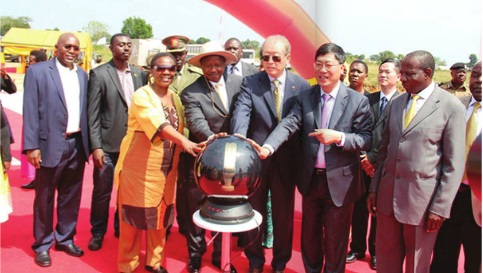
Muhakanizi told Kaliisa: “This ministry will not provide operational resources for the projects for the FY 2015/2016 unless the above issues have been addressed and detailed work plans for the projects have been submitted.”
Because this audit had been commissioned by UEGCL, its results intensified animosity between officials at the Energy Ministry, Energy Infratech and those at UEGCL.
The fight over control of the Karuma, Isimba projects was sparked by officials at the Energy Ministry allegedly accusing UEGCL of duplication of roles. This was after UEGCL, which is in charge of power generation, asked the Ministry of Finance money to enable it supervise works at the projects.
In a bid to justify its role, UEGCL mounted a lobbying campaign that led them to President Museveni. In a meeting led by Isabalijja, the officials exposed how because of what they called power supervision and poor works by the contractors—Sinohydro as the EPC contractor and Energy Infratech as the supervisor—the dams were under threat. As a result, on March 22, 2016, President Museveni tasked Energy minister Irene Muloni to urgently look into the matter. He even at some point suggested that Energy Infratech be dismissed. Before she could respond, President Museveni on April 5 unleashed another letter saying the UEGCL audit findings had confirmed issues he had earlier in March raised with her in a letter.
“How could this happen,” President Museveni asked in the letter, “Didn’t we have any supervision from government on these facilities?”
Museveni was also concerned that even UEGCL, the implementing agency for the project, has raised these issues through the Project Management Consultants (PMCs) and lately the Panel of Experts (PoEs) but the ministry continued with inaction yet work on the project is continuing. He ordered the works be halted and investigations conducted into the project. He also ordered the suspension of three officials at MEMD; Paul Mubiru; the Accounting Officer, Henry Bidasala; the director Energy Resource Development and Karuma project coordinator, and Cecila Menya; the project coordinator for Isimba. They are still on suspension.
Following Museveni’s directive, Muloni swung into action, conducted investigations and in April issued the policy directives now under contention.
Kaliisa also constituted his own ad hoc committee to investigate the allegations raised by UEGCL experts. Although the committee’s independence has been cast in doubt because it reports to Kaliisa under whose watch the alleged improprieties were committed, it has some prominent personalities.
These include Prof. John Ssenfuma (chairperson), Prof. Jackson Mwakali, (Department of Civil and Environmental Engineering at Makerere), Prof. Henry Arinaitwe (Principal of College of Engineering, Design, Art and, Technology at Makerere University) and representatives from the Justice, Public Service Ministries and Internal Security Organisation (ISO).
According to their terms of reference, a copy of whichThe Independent has seen, the members are supposed to establish the validity and extent of allegations ranging from the reported shoddy works at Karuma and Isimba dams and establish the steps taken to correct the defects.
They are also supposed to investigate the capacity of Energy Infratech.
Another audit might be ordered if the High Court case concerning Karuma and Isimba is decided in favour of the petitioner, Henry Kyalimpa, who is challenging six entities involved in the construction of the dam projects.
Kyalimpa wants court to order for an independent audit claiming it will reveal the extent of the mess in the projects and result in corrective measures before it is too late. According to documents filed by the contractors, the works at Karuma and Isimba are at 30 percent completion.
Kyalimpa’s lawyer, Mohmed Mbabazi told The Independent that, according to his client, “the whole construction process must be legalised because whatever is going on now is irregular.”
Mbabazi says they want court to order for “either correcting the defects or wholly discontinuing the projects”.
The Independent has seen written defenses filed in the High Court at the end of May the Attorney General, Sinohydro, UEGCL, and Energy Infratech. Only China’s Exim Bank has not filed. Another defendant, China Water and Electricity Corporation (CWE), The Independent has learnt, is not directly involved in the construction process because once it was given the Isimba contract, it subcontracted Sinohydro. However, CWE, has also already filed its defence.
All the defendants have one major defence: that whatever Kyalimpa is seeking from court cannot be given because it is impracticable.
This is the third time Kyalimpa is suing the government over the projects. He first petitioned the Trial Court of the East African Court of Justice (EACJ) over the way the projects were procured. He lost the case but won an appeal when the Appellate Court upheld his petition saying the procurement of the projects contravened Ugandan.
The court noted, however, that halting of the procurement process that Kyalimpa was seeking was impracticable as construction was already on-going.
Kyalimpa is suing again because, he says, consequent to the judgment of the EACJ, it has now come to light that the projects “are mired in acts of corruption, misuse and wastage of public resources that render the project uneconomic and unviable”.
Government officials, however, appear unbothered about the case. Critics say it is because previous judgements have not stopped the projects. They were simply ignored. So far, there is no sign that the current round of audits and any court rulings will also not be ignored
 The Independent Uganda: You get the Truth we Pay the Price
The Independent Uganda: You get the Truth we Pay the Price


